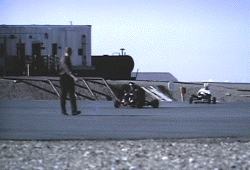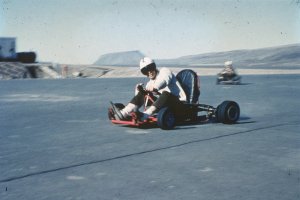BMEWS - 510 Full Days - All Work and No Play ...
Working nine hours a day, seven days a week,
would seem to leave little time for recreation. Actually, we had
quite a lot of time for diversions, and were rarely bored. We
would spend hours visiting and listening to records in each others'
rooms. We went to movies at the base theater. There was an active,
very well equipped photo club and many of us bought good cameras
through the club. We did a lot of hiking and exploring when the
weather allowed. Many of us were little more than kids, mostly
in our early 20's, and were generally pretty inventive in finding
ways to be entertained.
 During the time that I spent at Thule, a
number of us founded what I think to be the northernmost motor
racing club in the world, "The Arctikarters". This started
when my friend Bil and I bought a homemade go-kart from a serviceman
at Thule. The airman built the kart in a hangar on the flight
line. Through him, we received permission to keep the kart in
the hangar and to use the hangar to run it when there were no
aircraft parked there. During the cold, dark months, this was
a great diversion. Word soon spread that we were playing with
the kart in the hangar. It wasn't long before there were a dozen
people taking turns driving the kart, sliding around the polished
concrete floor of the hangar. While on vacation at home, one of
the RCA employees bought half a dozen go karts and cut them up
into pieces that could be shipped by Parcel Post and reassembled
at Thule. Suddenly, we had a racing club! In the summer, with
twenty-four hour daylight and moderate temperatures, we raced
all "night" long on the deserted B-52 pads along the
taxiway.
During the time that I spent at Thule, a
number of us founded what I think to be the northernmost motor
racing club in the world, "The Arctikarters". This started
when my friend Bil and I bought a homemade go-kart from a serviceman
at Thule. The airman built the kart in a hangar on the flight
line. Through him, we received permission to keep the kart in
the hangar and to use the hangar to run it when there were no
aircraft parked there. During the cold, dark months, this was
a great diversion. Word soon spread that we were playing with
the kart in the hangar. It wasn't long before there were a dozen
people taking turns driving the kart, sliding around the polished
concrete floor of the hangar. While on vacation at home, one of
the RCA employees bought half a dozen go karts and cut them up
into pieces that could be shipped by Parcel Post and reassembled
at Thule. Suddenly, we had a racing club! In the summer, with
twenty-four hour daylight and moderate temperatures, we raced
all "night" long on the deserted B-52 pads along the
taxiway.

On one occasion, the base exchange stocked
a number of model airplane kits and motors. The news of this spread
rapidly, and the entire stock was sold out in less than an hour,
many of us buying five or six kits and motors each! We built models
in our rooms and flew them in the same hangar where we ran the
go kart.
One of the tracker transmitter technicians
who was a steam engine enthusiast built a working engine from
scraps of copper tubing, teflon sheet, and steel angle iron. Pete
designed and built the engine while we were on duty with otherwise
little to do at J Site. Having no steam, we connected the engine
to a 90 psi compressed air line in the transmitter bay, and it
ran. We attached the engine to a hand truck to which we added
a pair of wheels at the front, the handle end, and a steering
tiller, making a car which we could drive around the transmitter
bay, tethered to the compressed air by a hose. The engine supplied
power to one of the hand truck's wheels through a go kart chain
and homemade sprockets which we fashioned from quarter-inch aluminum
sheet. The engine had tremendous torque which caused the wheel
to spin a little each revolution, leaving small black marks on
the white tile transmitter bay floor. Our shift supervisor couldn't understand where these marks were
coming from until he caught us driving around the bay one night.
Certain that we were in for it, we were relieved when he wanted
to take it a spin, too. I learned much of steam power from Pete
and his engine and became somewhat of a steam enthusiast myself.
Table of Contents
Next
© Copyright 1996, Gene P. McManus, Baltimore, OH
 During the time that I spent at Thule, a
number of us founded what I think to be the northernmost motor
racing club in the world, "The Arctikarters". This started
when my friend Bil and I bought a homemade go-kart from a serviceman
at Thule. The airman built the kart in a hangar on the flight
line. Through him, we received permission to keep the kart in
the hangar and to use the hangar to run it when there were no
aircraft parked there. During the cold, dark months, this was
a great diversion. Word soon spread that we were playing with
the kart in the hangar. It wasn't long before there were a dozen
people taking turns driving the kart, sliding around the polished
concrete floor of the hangar. While on vacation at home, one of
the RCA employees bought half a dozen go karts and cut them up
into pieces that could be shipped by Parcel Post and reassembled
at Thule. Suddenly, we had a racing club! In the summer, with
twenty-four hour daylight and moderate temperatures, we raced
all "night" long on the deserted B-52 pads along the
taxiway.
During the time that I spent at Thule, a
number of us founded what I think to be the northernmost motor
racing club in the world, "The Arctikarters". This started
when my friend Bil and I bought a homemade go-kart from a serviceman
at Thule. The airman built the kart in a hangar on the flight
line. Through him, we received permission to keep the kart in
the hangar and to use the hangar to run it when there were no
aircraft parked there. During the cold, dark months, this was
a great diversion. Word soon spread that we were playing with
the kart in the hangar. It wasn't long before there were a dozen
people taking turns driving the kart, sliding around the polished
concrete floor of the hangar. While on vacation at home, one of
the RCA employees bought half a dozen go karts and cut them up
into pieces that could be shipped by Parcel Post and reassembled
at Thule. Suddenly, we had a racing club! In the summer, with
twenty-four hour daylight and moderate temperatures, we raced
all "night" long on the deserted B-52 pads along the
taxiway.